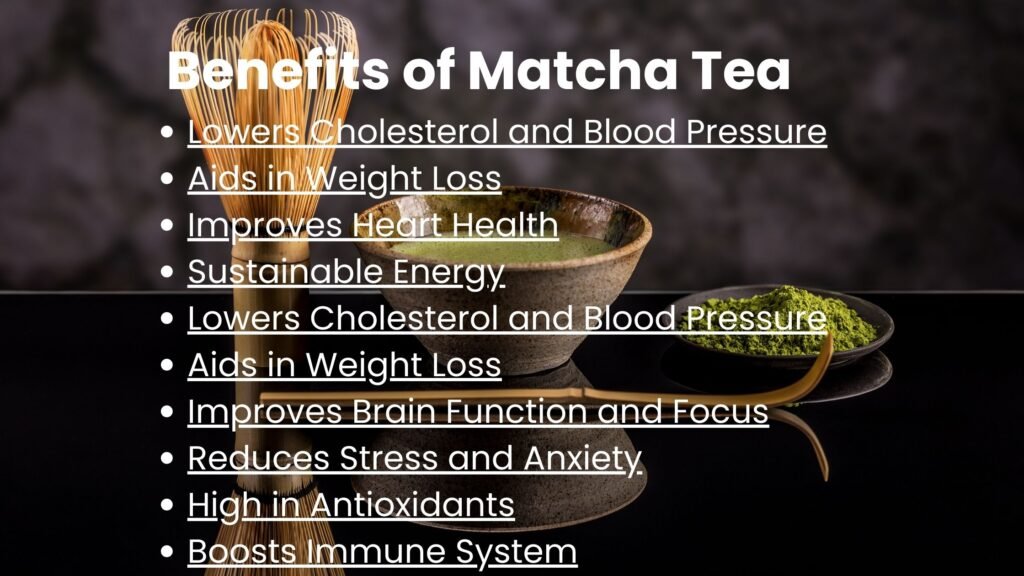Definition of Matcha Tea
Matcha tea is a finely ground, powdered green tea made from the leaves of the Camellia sinensis plant. Unlike other green teas, matcha is grown and processed in a unique way that enhances its nutritional profile and flavor. The tea plants are shaded for several weeks before harvest, which increases their chlorophyll content and gives matcha its vibrant green color. After harvesting, the tea leaves are steamed, dried, and stone-ground into a fine powder. This process allows you to consume the entire leaf, providing a concentrated source of antioxidants, vitamins, and minerals. The health benefits of matcha tea are numerous, making it a popular choice for those looking to boost their overall well-being.
Origin and History of Matcha Tea
Matcha tea originated in China over 1,000 years ago, but it was in Japan that it truly flourished and became an integral part of the traditional Japanese tea ceremony. Known as Chanoyu, Sado, or Ocha, this ceremony is a highly ritualized and formalized event where matcha tea is prepared and served to guests in a specially designed room. The ceremony is not just about drinking tea; it is an art form that emphasizes the beauty of nature, the spiritual connection between host and guests, and the mindfulness of the present moment. Japanese tea ceremonies have used matcha for centuries, promoting peace and mindfulness as an integral part of social and spiritual practices in Japan. Over the centuries, matcha tea has become a symbol of Japanese culture and a testament to the country’s rich heritage.
Difference Between Matcha Tea and Green Tea
While both matcha tea and green tea come from the same Camellia sinensis plant, their processing and preparation methods set them apart. Green tea is made by steeping the leaves in hot water, which extracts some of the nutrients and flavors. In contrast, matcha tea involves grinding the entire leaf into a fine powder and mixing it with hot water, allowing you to consume the whole leaf and all its nutrients. This results in a more concentrated and nutrient-rich beverage. Matcha tea also boasts a more vibrant green color and a richer, more complex flavor compared to regular green tea. The unique preparation method of matcha ensures that you get the maximum health benefits from every cup.
Benefits of Matcha Tea

Lowers Cholesterol and Blood Pressure
Drinking matcha tea has been shown to lower LDL cholesterol levels and reduce blood pressure.
The catechins present in matcha tea may help to prevent the formation of blood clots and reduce the risk of heart disease.
Additionally, green tea catechins activate thermogenic fat burning activities, aiding in weight loss and metabolism enhancement.
Aids in Weight Loss
Matcha tea has been shown to increase thermogenesis and fat burning, making it a potential aid in weight loss.
The caffeine and catechins present in matcha tea may help to increase metabolism and boost energy levels.
Improves Heart Health
Matcha tea has been shown to reduce the risk of heart disease by lowering cholesterol levels and preventing the formation of blood clots.
The antioxidants present in matcha tea may help to protect against cell damage and reduce inflammation.
Green tea extract, particularly in the form of matcha, may help protect the liver by reducing liver enzyme levels, offering additional health benefi
Sustainable Energy
One of the key matcha benefits is that drinking matcha tea has been shown to lower LDL cholesterol levels and reduce blood pressure.
The catechins present in matcha tea may help to prevent the formation of blood clots and reduce the risk of heart disease.
Additionally, green tea catechins activate thermogenic fat burning activities, aiding in weight loss and metabolism enhancement.
Lowers Cholesterol and Blood Pressure
Drinking matcha tea has been shown to lower cholesterol and blood pressure in several studies. The catechins present in matcha tea, particularly EGCG, have been found to inhibit the absorption of dietary cholesterol and reduce the levels of LDL (bad) cholesterol in the blood. Additionally, the potassium content in matcha tea can help lower blood pressure by counteracting the effects of sodium and promoting healthy blood vessel function. By incorporating matcha tea into your daily routine, you can support your cardiovascular health and reduce the risk of heart disease.
Aids in Weight Loss
Matcha tea has been found to aid in weight loss by increasing metabolism and fat burning. The catechins present in matcha tea, particularly EGCG, have been shown to increase the body’s thermogenesis, which is the rate at which the body burns calories. Additionally, matcha tea has been found to suppress appetite and increase feelings of fullness, making it a useful tool for weight loss. By drinking matcha tea regularly, you can boost your metabolism, enhance fat burning, and support your weight loss goals in a natural and healthy way.
Improves Brain Function and Focus
The L-theanine present in matcha tea may help to improve focus and concentration by promoting a state of relaxation and reducing distractions.
Matcha tea has been shown to improve memory and cognitive function in both young and old adults. Scientific studies have shown that individuals who drank matcha experienced significant improvements in memory and brain function, particularly in areas responsible for advanced thinking and processing information.
Reduces Stress and Anxiety
The L-theanine present in matcha tea may help to reduce stress and anxiety by promoting a state of relaxation and reducing cortisol levels.
Matcha tea has been shown to reduce symptoms of depression and improve overall mood.
High in Antioxidants
Matcha tea is high in antioxidants, including catechins and polyphenols, which may help to protect against cell damage and reduce inflammation.
The antioxidants present in matcha tea may help to reduce the risk of certain diseases, such as heart disease and cancer. Additionally, drinking green tea, which also contains high levels of antioxidants, can lower the risk of diseases like liver cancer and offer protective effects against inflammation and oxidative stress.
Boosts Immune System
Matcha tea has been shown to boost the immune system by increasing the production of antibodies and activating immune cells.
The antioxidants present in matcha tea may help to protect against infections and reduce the severity of illnesses.
Additional Benefits of Matcha Powder
May Improve Skin Health
The antioxidants present in matcha tea may help to protect against skin damage and reduce the signs of aging.
Matcha tea has been shown to improve skin elasticity and reduce the appearance of fine lines and wrinkles.
The anti-inflammatory properties of matcha green tea powder can also improve cardiovascular health and sleep quality, contributing to overall well-being.
May Support Healthy Hair and Scalp
The antioxidants present in matcha tea may help to protect against hair loss and promote healthy hair growth.
Matcha tea has been shown to improve scalp health and reduce the risk of dandruff and other scalp conditions.
How to Include Matcha Tea in Your Diet:
Enjoy matcha as a traditional hot tea by whisking it with hot water.
Create creamy matcha lattes with your choice of milk or dairy alternatives.
Blend matcha powder into smoothies for an antioxidant-packed boost.
Use matcha in baking to make desserts like cookies, cakes, or muffins.
Sprinkle matcha over yogurt, oatmeal, or chia pudding for a vibrant touch.
Experiment with savory recipes like matcha-infused salad dressings or sauces. There are numerous ways to consume matcha, making it a versatile and nutritious addition to your diet.
Try consuming matcha in the form of a matcha latte. Prepare it by whisking quality matcha with hot water, then adding your choice of milk or dairy alternatives. Enhance the flavor with delightful ingredients like vanilla, honey, or cinnamon, and get creative with your customizations.
Choosing Quality Matcha
When choosing quality matcha, it’s essential to focus on a few key factors. First, consider the grade: ceremonial grade is ideal for drinking due to its rich flavor and smooth texture, while culinary grade works best for cooking and baking. The color is another important indicator—high-quality matcha should have a vibrant, bright green hue, which reflects its freshness and high chlorophyll content. Additionally, check the origin; matcha sourced from authentic regions like Uji in Japan is known for superior quality. Opt for organic matcha to avoid harmful chemicals and ensure a purer product. It is also crucial to select high-quality matcha powders, as some products may contain additives like sweeteners and milk that can diminish their health benefits. Finally, buy from reputable brands or trusted sellers to guarantee authenticity and freshness, giving you the full health benefits and taste experience matcha has to offer.
Precautions and Side Effects
Potential Negative Effects of Matcha
Excessive consumption of matcha tea may lead to negative side effects, such as anxiety, insomnia, and increased heart rate. However, consuming green tea powder daily has been shown to improve brain function and memory, particularly in elderly individuals, according to studies on matcha.
Matcha tea may interact with certain medications, such as blood thinners, and reduce their effectiveness.
Detoxification Benefits
Matcha green tea is not just a delicious beverage; it also offers powerful detoxification benefits that can help cleanse your body and promote overall health. Here’s how drinking matcha tea can support your body’s natural detoxification processes:
Removes Toxins and Heavy Metals: Matcha tea has been shown to help remove toxins and heavy metals from the body. The high levels of chlorophyll in matcha act as a natural detoxifier, binding to harmful substances and aiding in their elimination.
Neutralizes Free Radicals: The antioxidants and catechins in matcha tea, particularly EGCG, help neutralize free radicals, which can cause cellular damage and contribute to aging and disease. By drinking matcha tea regularly, you can support your body’s natural antioxidant defenses.
Supports Liver Health: Matcha tea has a positive effect on the liver, one of the body’s primary detoxification organs. Studies have shown that the catechins in matcha can help protect the liver from damage and support its natural detoxification processes.
Promotes Overall Well-being: By supporting the body’s natural detoxification processes, matcha tea can lead to improved overall health and well-being. Regular consumption of matcha tea can help you feel more energized, reduce inflammation, and support a healthy immune system.
Traditional Medicine: Matcha tea has been used in traditional medicine for centuries to support detoxification and promote overall health. Its high levels of antioxidants and catechins make it a popular choice for those looking to cleanse their body naturally.
Incorporating matcha tea into your daily routine can be a simple yet effective way to support your body’s natural detoxification processes and enhance your overall health. Whether you enjoy it as a traditional hot tea, a creamy matcha latte, or a vibrant addition to your favorite recipes, matcha tea offers a delicious and healthful way to detoxify your body.
Conclusion
Matcha tea offers a unique combination of health benefits, from providing a calm and sustained energy boost to supporting focus, metabolism, and overall wellness. Its antioxidant-rich profile and natural detoxifying properties make it a powerful addition to any health-conscious routine. By incorporating matcha into your daily life, whether as a soothing tea, a vibrant latte, or a creative addition to recipes, you can experience its remarkable effects firsthand. Ready to embrace a healthier lifestyle? Start your journey today by trying matcha tea and unlocking its full potential for your mind and body!




